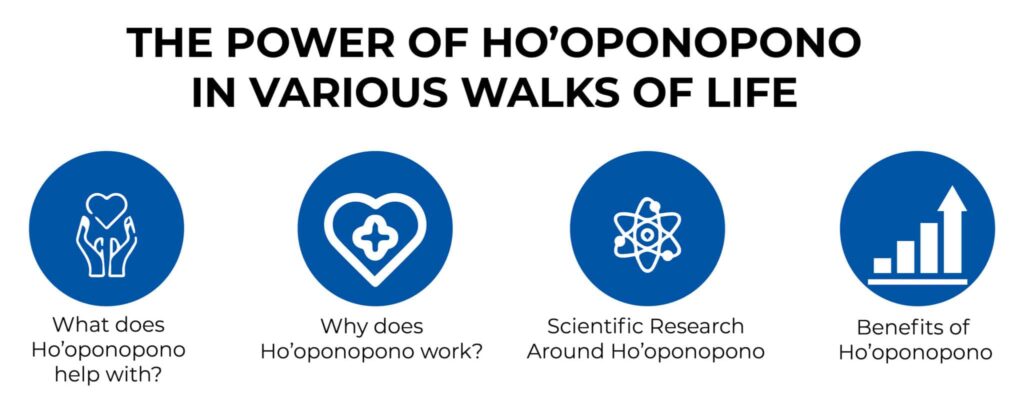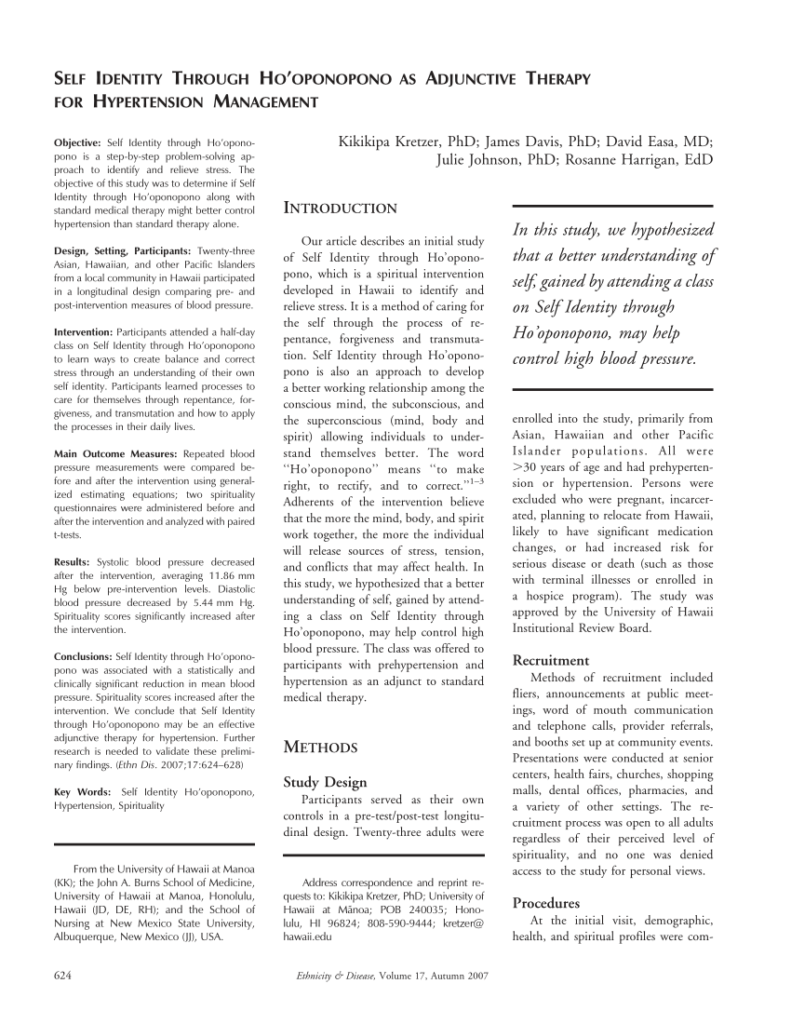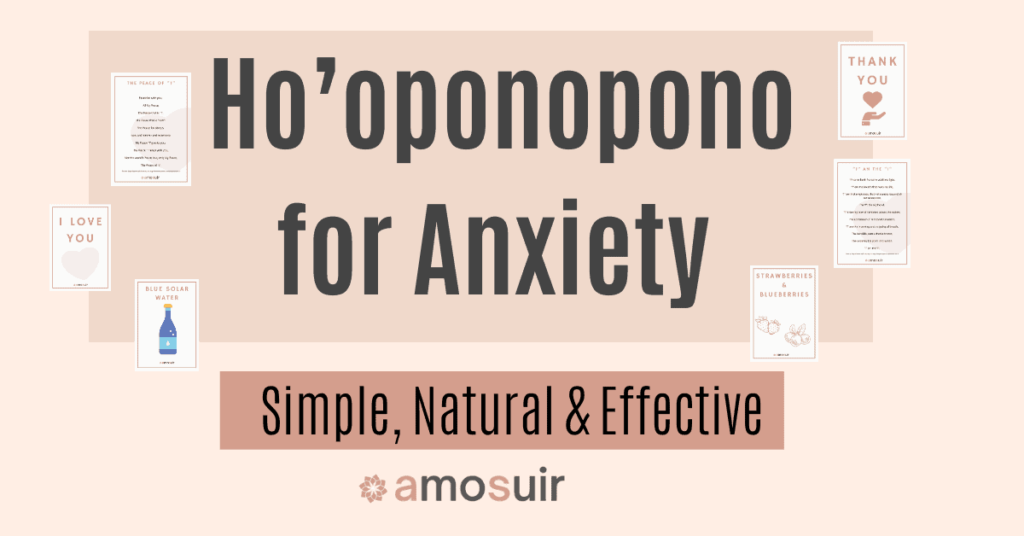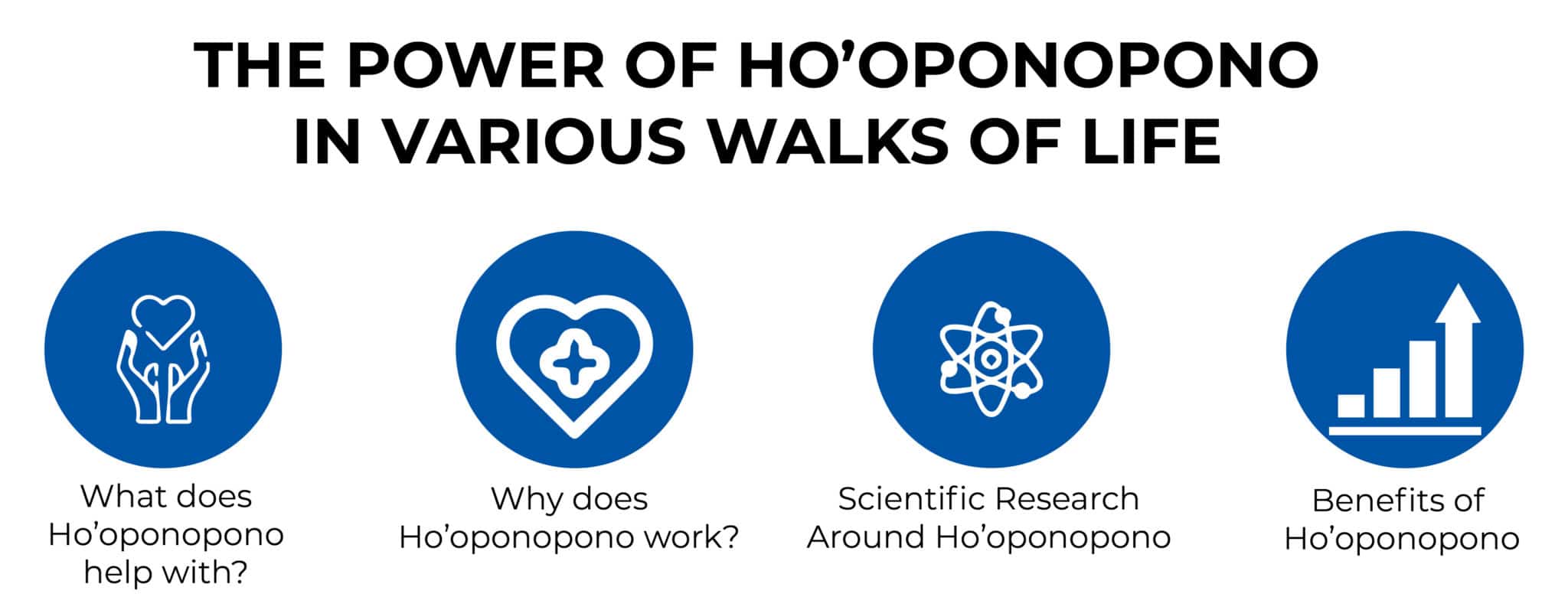In this article, you will learn about the scientific evidence surrounding the effectiveness of Ho’oponopono. Many people are intrigued by this ancient Hawaiian practice, which aims to bring about healing and forgiveness through the power of prayer and meditation. While there are numerous personal testimonies and anecdotes attesting to its effectiveness, the question remains: is there scientific proof to support these claims?
When it comes to scientific evidence, studies on the effectiveness of Ho’oponopono are limited. This is largely due to the challenges of measuring and quantifying the healing effects of spiritual practices. However, some researchers have embarked on exploring the potential benefits of Ho’oponopono. For example, a study conducted in 2012 found that the practice of Ho’oponopono led to a significant reduction in psychological distress and depressive symptoms among a group of female prisoners. While more research is needed to fully understand the scientific basis of Ho’oponopono’s effectiveness, these initial findings offer promising insights into its potential to promote well-being and healing.

Introduction to Ho’oponopono
What is Ho’oponopono?
Ho’oponopono is a traditional Hawaiian spiritual practice that focuses on reconciliation, forgiveness, and healing. It is rooted in the belief that negative experiences and emotions are a result of internal imbalances, and it seeks to restore harmony within oneself and with others.
Origins and cultural context
Ho’oponopono has deep roots in Hawaiian culture and has been practiced for generations. It was originally used as a family-centered approach to conflict resolution and restoration of relationships. Over time, it has evolved and expanded to address personal healing and wellbeing.
Major principles of Ho’oponopono
Ho’oponopono is based on several key principles. The first is taking responsibility for one’s actions, emotions, and experiences. This involves acknowledging that one’s internal state contributes to external circumstances. Secondly, it emphasizes the importance of forgiveness and letting go of resentment. Thirdly, it involves expressing gratitude and showing appreciation for oneself and others. Finally, it emphasizes the power of love and compassion in transforming relationships and promoting healing.
Understanding Effectiveness
Defining effectiveness in the context of Ho’oponopono
In order to determine the effectiveness of Ho’oponopono, it is essential to clarify what is meant by “effectiveness” in this context. In the case of Ho’oponopono, effectiveness can be understood as the ability of the practice to promote emotional and psychological well-being, resolve conflicts, and improve relationships.
Measuring effectiveness of spiritual practices
Measuring the effectiveness of spiritual practices such as Ho’oponopono presents unique challenges. Traditional scientific methods often rely on quantifiable data and objective measurements, which may not fully capture the subjective experiences and outcomes of spiritual practices. Therefore, alternative approaches and methodologies are needed to assess the effectiveness of Ho’oponopono.
Evaluating subjective and objective outcomes
When evaluating the effectiveness of Ho’oponopono, it is important to consider both subjective experiences and objective outcomes. Subjective experiences refer to individual perceptions of well-being, emotional healing, and personal growth. Objective outcomes, on the other hand, can include changes in physiological markers, improvements in relationships, and overall life satisfaction.
Critiques and Skepticism
Scientific critiques of Ho’oponopono
Ho’oponopono has faced scientific critiques, primarily due to the lack of empirical evidence supporting its claims. Skeptics argue that without controlled studies and objective measurements, it is difficult to attribute any positive outcomes solely to the practice of Ho’oponopono.
Challenges in conducting research on spiritual practices
Research on spiritual practices like Ho’oponopono faces several challenges. For instance, it may be challenging to find a control group that is comparable to those practicing Ho’oponopono. Additionally, subjective experiences and outcomes are often difficult to quantify and measure using traditional scientific methods.
Skepticism towards non-traditional healing methods
There is often skepticism towards non-traditional healing methods in the scientific community. Critics argue that without empirical evidence and scientific validation, it is difficult to separate the effects of Ho’oponopono from a placebo effect or other external factors.
Scientific Studies on Ho’oponopono
Overview of existing scientific research
While the scientific research on Ho’oponopono is limited, there are some studies that have explored its potential benefits. These studies have primarily focused on subjective experiences and qualitative data, aiming to provide insights into the impact of Ho’oponopono on emotional well-being and personal healing.
Case studies and anecdotal evidence
Case studies and anecdotal evidence can offer valuable insights into the potential effectiveness of Ho’oponopono. These individual accounts often highlight the transformative power of the practice, emphasizing the positive impact it can have on personal growth, forgiveness, and emotional healing.
Quantitative and qualitative studies
Although quantitative studies on Ho’oponopono are scarce, qualitative studies have shed light on the psychological and emotional benefits. Such studies often rely on self-report measures, interviews, and observations to gather data on participants’ experiences and perceived outcomes of the practice.

Psychological and Emotional Benefits
Ho’oponopono’s impact on psychological well-being
Many practitioners of Ho’oponopono report a positive impact on their psychological well-being. The practice encourages self-reflection and introspection, helping individuals develop a deeper understanding of their emotions and thought patterns. This can lead to increased self-awareness and an improved sense of emotional balance.
Stress reduction and relaxation
Ho’oponopono is often used as a tool for stress reduction and relaxation. By addressing unresolved emotions and conflicts, individuals can experience a sense of relief and a decrease in stress levels. This, in turn, can contribute to improved overall well-being and mental health.
Emotional healing and increased self-awareness
Emotional healing is a central aspect of Ho’oponopono. By practicing forgiveness and releasing negative emotions, individuals can experience a greater sense of inner peace, healing, and personal growth. Increased self-awareness also allows individuals to identify and address patterns of behavior that may be detrimental to their well-being.
Physical Health Effects
Medical research on Ho’oponopono
Medical research on Ho’oponopono is still limited, but some studies suggest potential connections between the practice and physical health. These studies often focus on the mind-body connection and posit that emotional healing and stress reduction can positively impact physical health.
Placebo effect and psychosomatic healing
The placebo effect and psychosomatic healing play a significant role in understanding the potential physical health effects of Ho’oponopono. The power of belief and the mind’s influence on the body cannot be underestimated, and it is possible that the practice of Ho’oponopono can tap into these mechanisms to promote healing.
Potential impact on immune system and overall health
While scientific evidence is limited, there are anecdotal accounts of individuals who believe that practicing Ho’oponopono has had a positive impact on their immune system and overall health. By addressing emotional and psychological imbalances, it is thought that the practice can indirectly support physical health.
Cultural Relevance and Holistic Approach
Ho’oponopono’s significance to indigenous cultures
Ho’oponopono is deeply rooted in Hawaiian culture and holds significant cultural importance. It is considered a traditional healing method that addresses the mind, body, and spirit, and is often seen as a way to honor and preserve indigenous wisdom and practices.
Integration of spirituality and healing
One of the unique aspects of Ho’oponopono is its integration of spirituality and healing. The practice recognizes the interconnectedness of the mind, body, and spirit, and promotes holistic well-being. This holistic approach can provide individuals with a sense of empowerment and a deeper understanding of themselves.
Addressing the mind-body-spirit connection
Ho’oponopono acknowledges the mind-body-spirit connection and emphasizes the interconnectedness of these aspects of human experience. By addressing emotional and spiritual imbalances, it is believed that the practice can positively impact not only psychological and emotional well-being, but also physical health.
Limitations and Controversies
Methodological challenges in studying Ho’oponopono
One of the main limitations in studying Ho’oponopono is the lack of standardized methodologies. The practice can vary significantly among practitioners, making it challenging to conduct controlled studies with consistent variables. This variability makes it difficult to draw generalizable conclusions about its effectiveness.
Controversial claims and lack of empirical evidence
Ho’oponopono has faced criticism for its controversial claims and lack of empirical evidence. Without rigorous scientific studies to support its effectiveness, it remains a controversial practice in some scientific circles. However, proponents argue that the power of personal experiences and individual testimonials cannot be dismissed.
Ethical considerations in promoting alternative therapies
Promoting alternative therapies like Ho’oponopono requires careful consideration of ethical implications. It is important to ensure that individuals have access to accurate information and are not misled by false claims. Responsible promotion involves maintaining transparency and providing a balanced perspective on the available scientific evidence.

Alternative Perspectives
Analogous practices and their scientific support
While research on Ho’oponopono specifically is limited, other analogous practices have been studied and shown promising results. Practices such as meditation, mindfulness, and forgiveness interventions have been scientifically supported in promoting emotional well-being and improving psychological outcomes.
Comparisons with other healing modalities
Ho’oponopono can also be compared with other traditional and complementary healing modalities. Practices like acupuncture, yoga, and herbal remedies have been extensively studied and shown evidence of effectiveness. Drawing comparisons with these practices can provide insights into potential mechanisms of action for Ho’oponopono.
Exploring diverse spiritual perspectives
It is important to approach the evaluation of Ho’oponopono with an open mind and an appreciation for diverse spiritual perspectives. Different cultures and belief systems provide unique frameworks for understanding and promoting well-being. Exploring these perspectives can facilitate a deeper understanding of the potential benefits of Ho’oponopono.
Conclusion
In conclusion, while scientific research on Ho’oponopono is limited, there is anecdotal evidence and qualitative studies suggesting its potential effectiveness. Ho’oponopono has been reported to have positive psychological and emotional benefits, as well as potential implications for physical health. However, due to methodological challenges and the absence of rigorous scientific studies, skepticism remains within the scientific community. Further research is needed to explore the potential benefits of Ho’oponopono and build upon the existing evidence. Ultimately, the decision to engage in Ho’oponopono or any spiritual practice should be based on personal beliefs, experiences, and a nuanced understanding of the available scientific evidence.

